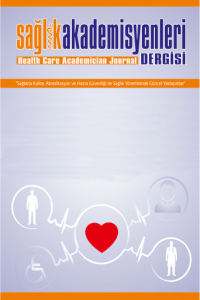COVID-19 pandemisinde uzaktan eğitimin ebelik bölümü akademisyenlerinin duygusal emek ile tükenmişlik düzeylerine etkisinin incelenmesi
COVID-19 Pandemisi, Ebelik, Akademisyen, Duygusal emek, Tükenmişlik
Investigation of the effect of distance education on the emotional labor and burnout levels of the academicians of the department of midwifery in the COVID-19 pandemic
COVID-19 Pandemic, Midwifery, Academician, Emotional labor, Burnout,
___
- Genç, S.Z., Engin, G., Yardım, T. (2020). Pandemi (Covid-19) sürecindeki uzaktan eğitim uygulamalarına ilişkin lisansüstü öğrenci görüşleri. Atatürk Üniversitesi Kazım Karabekir Eğitim Fakültesi Dergisi, 41: 134-158.
- Can, E. (2020). Coronavirüs (Covid-19) pandemisi ve pedagojik yansımaları: Türkiye’de açık ve uzaktan eğitim uygulamaları. Açıköğretim Uygulamaları ve Araştırmaları Dergisi, 6(2), 11-53.
- Hu, D., Kong, Y., Li, W., Han, Q., Zhang, X., & Zhu, L. X. (2020). Frontline nurses’ burnout, anxiety, depression, and fear statuses and their associated factors during the COVID-19 outbreak in Wuhan, China: A largescale cross-sectional study. EClinicalMedicine, 24:100424.
- Li, Q., Guan, X., Wu, P., Wang, X., Zhou, L., & Tong, Y. (2020). Early transmission dynamics in Wuhan, China, of novel coronavirus–infected pneumonia. N. Engl. J. Med., 382, 1199–1207.
- Koyuncuoğlu, Ö. (2021). Covıd-19 Pandemi Sürecinde Yükseköğretim Kurumlarında Tükenmişlik. Serüven Yayınevi, İzmir.
- UNESCO (2021). Global Education Coalition. Erişim tarihi: 14.09.2021. https://en.unesco.org/covid19/educationresponse/globalcoalition adresinden erişildi.
- Luyben, A., Fleming, V., & Vermeulen, J. (2020). Midwifery education in COVID-19-time: Challenges and opportunities. Midwifery, 89, 102776.
- Wynter, K., Holton, S., Considine, J., Hutchinson, A. M., Munt, R., Williams, R., et al. (2022). The impact of the COVID-19 pandemic on Australian hospital-based nursing and midwifery educators. Collegian, 29(3), 271-280.
- Ghasemi, F., Zarei, M., Heidarimoghadam, R., & Hosseini, S. M. (2021). Exploring unprecedented problems of academicians during the COVID 19 pandemic and their relationships with fatigue and mental health. Gene Reports, 23, 101098.
- Kahlon, J.K. (2021). Covid 19: To study, Emotional labor psychological distress, burnout & resilience in teachers. International Journal of Research Publication and Reviews, 2(10): 66-72.
- Tunguz, S. (2016). In the eye of the beholder: Emotional labor in academia varies with tenure and gender. Studies in Higher Education, 41(1), 3-20.
- Yin, H., Huang, S., & Chen, G. (2019). The relationships between teachers’ emotional labor and their burnout and satisfaction: A meta-analytic review. Educational Research Review, 28, 100283.
- Newcomb, M. (2021). The emotional labour of academia in the time of a pandemic: A feminist reflection. Qualitative Social Work, 20(1-2), 639-644.
- Rinfret, S. R., McCandless, S., & Grewell, C. (2022). Emotional labor & COVID-19: MPA program director perspectives. Journal of Public Affairs Education, 1-18.
- Kemaloğlu, N. (2022). Efl Instructors'emotıons And Emotıonal Labor Strategıes Durıng The Covıd-19 Pandemıc In Turkey (Master's thesis, Middle East Technical University).
- Mitchell, R. (2020). On the Verge of Burnout: Covid-19’s impact on faculty wellbeing and career plans. Erişim tarihi: 24.04.2021. https://connect.chronicle.com/rs/931-EKA-218/ images/Covid%26FacultyCareerPaths_ Fidelity_ResearchBrief_v3%20 %281%29.pdf adresinden erişildi.
- Basım, H. N., & Beğenirbaş, M. (2012). Çalışma yaşamında duygusal emek: Bir ölçek uyarlama çalışması. Yönetim ve Ekonomi Dergisi, 19(1), 77-90.
- Yıldırım, M., & Solmaz, F. (2022). COVID-19 burnout, COVID-19 stress and resilience: Initial psychometric properties of COVID-19 Burnout Scale. Death Studies, 46(3), 524-532.
- Koyuncuoğlu, Ö. (2020). Yükseköğretimde Yeni Normalleşme Senaryoları ve Önerileri. Turkish Studies, 15(6), 635-662.
- Erol, İ., Çayak, S. (2022). Yükseköğretimde belirsizlik: Covid-19 pandemisi sürecinde ve sonrasındaki yeni dünya düzeninde akademisyen olmak. Yükseköğretim Dergisi, 12(1), 122-142.
- Marinoni, G., Van’t Land, H., Jensen, T. (2020). The impact of Covid-19 on higher education around the world. IAU Global Survey Report, International Association of Universities. France.
- Thomas, C. M., Bantz, D. L., & McIntosh, C. E. (2019). Nurse faculty burnout and strategies to avoid it. Teaching and Learning in Nursing, 14(2), 111-116.
- Sánchez-Pujalte, L., Mateu, D.N., Etchezahar, E., Gómez Yepes, T. (2021). Teachers’ Burnout during COVID-19 pandemic in Spain: Trait emotional intelligence and socioemotional competencies. Sustainability, 13, 7259.
- Pressley, T. (2021). Factors contributing to teacher burnout during COVID-19. Educational Researcher, 50(5), 325-327.
- Doghonadze, N. (2021). Teacher burnout and COVID-19 pandemic. IRCEELT-2021, 250.
- Sacco, T. L., & Kelly, M. M. (2021). Nursing faculty experiences during the COVID-19 pandemic response. Nursing Education Perspectives, 42(5), 285.
- Alsaggaf, A. U., Bustani, M., Abid, M., Hakeem, F. F., & Abed, H. (2022). Burnout assessment among academic dental staff during COVID‐19: Data from Arab countries. Journal of Dental Education.1-9.
- Auger, G. A., & Formentin, M. J. (2021). This is depressing: The emotional labor of teaching during the pandemic spring 2020. Journalism & Mass Communication Educator, 76(4), 376-393.
- Grace, S. (2021). Exploring Faculty Emotions, Emotional Labor, and Teaching in Higher Education: A Mixed-Method Approach (Doctoral dissertation, The University of Arizona).
- Zaretsky, R., Katz, Y.J. (2019). The relationship between teachers' perceptions of emotional labor and teacher burnout and teachers' educational level. Athens Journal of Education, 6(2): 127-144.
- Knapp, K. M., Venner, S., McNulty, J. P., & Rainford, L. A. (2022). The risk of burnout in academic radiographers during the COVID-19 pandemic. Radiography, 28(4), 1010-1015.
- Čopková, R. (2021). The relationship between burnout syndrome and boreout syndrome of secondary school teachers during COVID-19. Journal of Pedagogical Research, 5(2), 138-151.
- ISSN: 2148-7472
- Yayın Aralığı: Yılda 4 Sayı
- Başlangıç: 2014
- Yayıncı: Dünya Kongre
Hemşirelikte Tamamlayıcı Ve Destekleyici Tedaviler Konulu Yayınlara Global Bakış
Hatice ÖNTÜRK AKYÜZ, Selma DİLMEN KALI
Hekimlerin Klinik Kaliteye Bakış Açısını Ölçmeye Yönelik Bir Ölçek Geliştirme: Metodolojik Çalışma
Mehmet KOCA, Feyza İNCEOĞLU, Alev KÖKSAL, Serdar DENİZ
Bilge ÖNAL DÖLEK, Ajala Dare ADELEKE
Sağlık çalışanlarının COVID-19 pandemisi döneminde iş verimliliği düzeylerinin incelenmesi
Zeynep YENTUR, Ahmet TEKE, Hasan Uğur ÖNCEL
Pelvik organ prolapsusu hakkında en çok alıntı yapılan 100 makale: Bibliyometrik analiz
Ayhan ATIGAN, Alev ATIGAN, Soner GÖK
Bir Hastanede Periferal İntravenöz Kateter Yerleştirme Sıklığı Ve İlişkili Faktörlerin Belirlenmesi
Sağlık Turizmi İşletmelerinde Dijital Pazarlama Uygulamalarının Analizi: Kuşadası Örneği
Banu ŞİMŞEK, Ahu YAZICI AYYILDIZ
HEMŞİRELERİN ZAMAN YÖNETİMİ KONUSUNDAKİ BAŞARI DÜZEYLERİNİN DEĞERLENDİRİLMESİ
